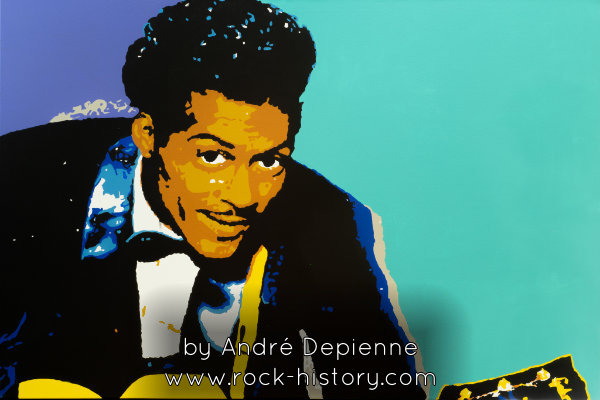Click on a picture to see more details.
Chuck Berry
Chuck Berry had a troubled youth, spending three years in juvenile prison in Algoa, near Jefferson City. After his release at the age of 21, he tried his luck in various professions, including a job as a hairdresser.
Four years after marrying Themetta Suggs, with whom he had two children, Chuck got a job as a doorman at the radio station, WEW. It turned out to be the start of his musical career. He bought an electric guitar from a musician he met there, got hold of a tape recorder and began recording his music.
Chuck performed publicly for the first time in 1952, in “Huff’s Garden”, St-Louis. Shortly afterwards he was hired as a stand-in with the “Johnnie Johnson Trio”, which led to a twenty year collaboration.
While performing at the “Cosmopolitan Club” in 1952, to an almost exclusively African-American audience. Word spread quickly about this black “hillbilly” wowing music fans. Soon after, almost half of the audience were white.
In 1955, following the advice of Muddy Waters, he approached “Chess Records”. Just a few weeks later, Chuck Berry reached the Billboard Chart's top ten with “Maybellene”, a song he’d written himself. Now with a three year record deal, Chuck went on tour, introducing the “duck walk” that was to become his signature move on stage.
In April 1956, he recorded one of his best known hits, “Roll Over Beethoven”. It was followed by such legendary songs as “Sweet Little Sixteen”, “Rock And Roll Music”, “Memphis Tennessee” and “Johnny B. Goode”.
Chuck Berry is regarded as a pioneer of rock ‘n’ roll, and was idolised by such legendary bands as the Beatles and the Rolling Stones.
Although he didn’t enjoy chart success throughout his career, he spent decades performing on stage, thrilling audiences worldwide.
Chuck Berry was found dead at his home in Wentzville, Missouri on 18 March, 2017 at the age of 90.



